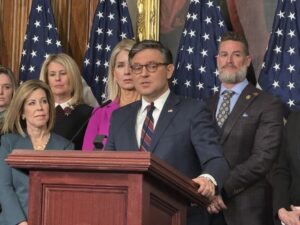New Jersey Librarians Navigate Rising Book Ban Pressures
In New Jersey, school librarians like Karen Grant are facing increasing demands from parents and conservative activists to remove books addressing race, gender, and sexuality from school libraries. Grant, alongside her colleagues at Ewing Public Schools, recently revised a longstanding policy to better handle challenges against controversial books, fearing that without it, they might easily succumb to censorship pressures.
Simultaneously, New Jersey lawmakers were crafting statewide legislation aimed at preventing book bans based on a book’s topic or the author’s background. This law also offers protections for librarians against legal actions arising from the materials they provide. Governor Phil Murphy’s signing of this measure was a relief for Grant and others in her position.
“We just hear so many stories of our librarians feeling threatened and targeted,” said Grant, who is also the president of the New Jersey Association of School Librarians. “This has been a wrong, an injustice that needs to be made right.”
As conservative-led book bans gain momentum nationally, several blue states, including New Jersey, are taking steps to safeguard reading freedom. According to Kasey Meehan, director of the Freedom to Read program at PEN America, “State leaders are demonstrating that censorship has no place in their state and that the freedom to read is a principle that is supported and protected.”
New Jersey, alongside states like California, Illinois, Maryland, Minnesota, and Washington, has legislated to maintain access to books addressing racial and sexual themes, including LGBTQ+ content. PEN America reported 10,000 instances of book bans nationwide in the 2023-24 school year, nearly tripling the previous year’s figures.
‘Lives are in the balance’
The New Jersey legislation sets minimum standards for local book challenge policies and prohibits schools from removing materials based on their origin or the creator’s views. It also shields librarians from civil and criminal repercussions for making good faith decisions on book selections.
State Sen. Andrew Zwicker, who introduced the legislation, was moved by a school librarian’s experience with harassment over LGBTQ+ themed books. “That’s when I realized that I was so horribly mistaken, that these attacks on librarians and on the freedom to read were happening everywhere,” Zwicker recounted. He noted that similar legislative efforts are being considered in Rhode Island.
Zwicker emphasized the importance of these books for marginalized communities, stating, “I do not think it’s an overstatement to say that lives are in the balance here, that these books are that important to people, and that librarians are trusted gatekeepers to ensure that what’s on the shelf of a library has been curated and is appropriate.”
Enforcement and penalties
State laws vary in enforcement and penalties for noncompliance. In Illinois, schools risk losing state grant funding if they engage in book bans, though this has not deterred all districts. Some, like St. Francis Area Schools near Minneapolis, continue to defy state policies by using conservative group BookLooks for book selection, which rates books on sexual and violent content.
In Maryland, Carroll County schools have led the state in book bans, removing at least 59 titles deemed “sexually explicit” during the 2023-2024 school year, according to PEN America. Kit Hart from Moms for Liberty equates such content in schools to providing minors with alcohol or drugs.
The future of book bans
Florida and Iowa have enacted laws facilitating the removal of books with sexual content, contributing to the high number of bans in those states. Other states like Idaho, Tennessee, and Utah have passed similar measures, while Arizona’s governor vetoed related legislation.
Legal challenges to these laws argue they infringe on free expression rights. Recently, a federal judge struck down parts of an Arkansas law that threatened librarians with prison for distributing “harmful” materials, a decision the state plans to appeal.
The American Library Association reports that most banned books feature LGBTQ+ protagonists. “Librarians have always been all about providing individuals with access to the information they need,” said Deborah Caldwell-Stone, emphasizing that censorship opposes this mission.
This story was originally produced by Stateline, part of States Newsroom.







Be First to Comment